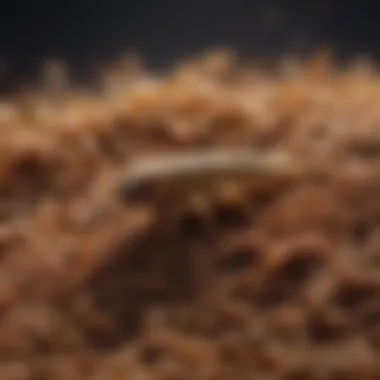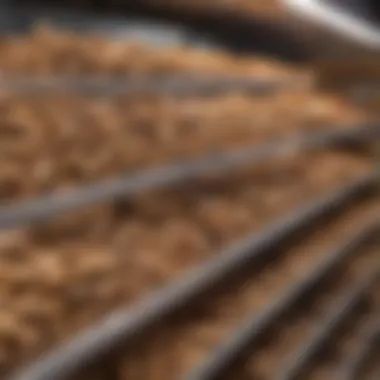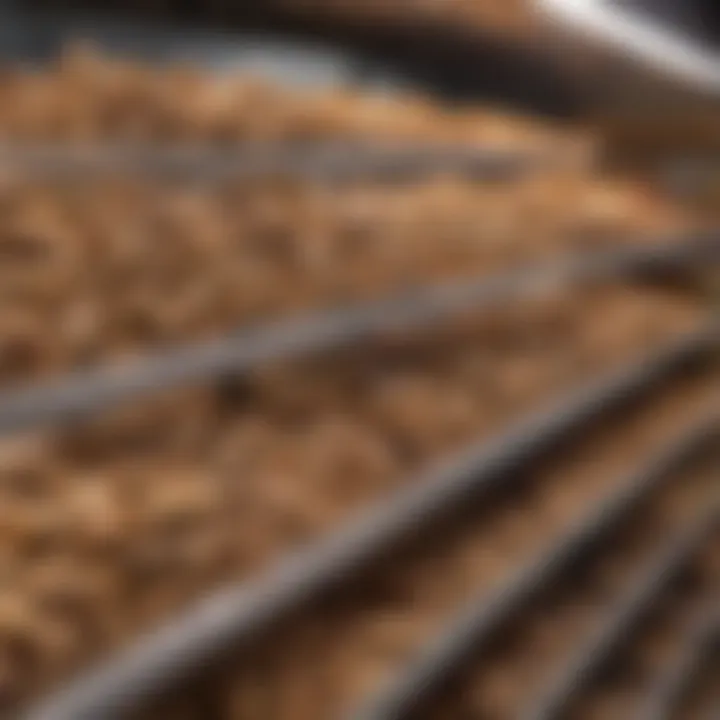Where to Buy Mealworms: A Comprehensive Guide


Intro
The increasing popularity of mealworms among pet owners necessitates a better understanding of where to source these important nutritional elements for insect-eating pets. Mealworms serve as a valuable food source, offering protein and essential vitamins that support the health of reptiles, birds, and other small animals. As the demand rises, various purchasing options emerge, making it crucial for pet owners to navigate the multitude of choices available.
This article aims to evaluate different avenues to procure mealworms. Each source will be examined for its advantages and disadvantages, focusing on aspects such as price, quality, and convenience. By presenting a comprehensive overview of the available options, pet owners can make informed decisions that best cater to their specific needs and that of their pets.
Where to Buy Mealworms
Online Retailers
In recent years, online retailers have become a popular choice for purchasing mealworms. They offer a wide variety of options, including live mealworms, dried mealworms, and even mealworm farming kits. Here are some notable online sources:
- Amazon: Known for its extensive selection, Amazon has several sellers offering mealworms, often with customer reviews to assist in the decision-making process.
- Reptile and Bird Specialty Shops: Websites like Petco or Chewy provide mealworms tailored for specific animals, ensuring that nutritional needs are met for reptiles or birds.
- Direct From Farmers: Many small farms or suppliers offer direct sales online, often promoting fresher quality products. If you are looking for bulk orders, these options can be cost-effective.
Local Stores
Many pet owners prefer the immediacy of purchasing mealworms from local stores. This option allows for direct inspection before buying, which can ensure quality. Local sources may include:
- Pet Stores: Almost all pet stores carry mealworms, particularly those focusing on reptiles or birds. Local pet supply shops often provide a selection of both live and dried options.
- Farmers’ Markets: Some farmers markets offer live food options, which can include mealworms. Here, buyers can often engage with sellers and learn more about how the mealworms are raised.
Mealworm Farming
For those looking to secure a sustainable supply of mealworms, starting a small mealworm farm at home can be an option worth exploring. Mealworms are relatively easy to care for, and farming them ensures a continuous supply. Key points include:
- Setup Requirements: This includes containers, bedding material such as oats or wheat bran, and a suitable environment.
- Care and Maintenance: Understanding the lifecycle of mealworms and their dietary needs is essential to a successful farming endeavor.
Closure
Selecting the right source for mealworms demands careful consideration. Each option comes with unique advantages that can align with the needs of pet owners and their pets. By weighing these factors, pet owners can assure their insect-eating pets receive the best nutrition while managing cost and convenience effectively.
Understanding Mealworms
Mealworms are an essential component of the diet for various insect-eating pets, including reptiles, birds, and some small mammals. Understanding mealworms entails recognizing their nutritional value, health advantages, and other key considerations that pet owners need to be aware of. This section aims to provide insights that will help pet owners make informed choices about integrating mealworms into their pets’ diets.
The significance of mealworms goes beyond just being a food source. Their growing popularity is rooted in their rich nutritional profile, which offers numerous benefits to pets' overall health. Moreover, with diverse forms available, owners can select mealworms that best suit their pets’ preferences.
When selecting mealworms, it is crucial for pet owners to understand what constitutes a quality product. Factors such as the mealworm's life stage, growth conditions, and sourcing practices are vital. This understanding helps ensure that pets receive high-quality nutrition, thereby supporting their well-being.
Nutritional Profile
The nutritional profile of mealworms is impressive. They are high in protein, making them an excellent source of essential amino acids. On average, mealworms contain about 50-60% protein by dry weight. This high protein content is beneficial for growth, reproduction, and overall vitality in pets.
In addition to protein, mealworms provide essential fatty acids, which are crucial for energy and skin health. They also contain vitamins such as B vitamins, particularly riboflavin, which supports metabolism, and minerals like calcium and phosphorus, vital for bone health and other bodily functions.
- Protein: Generally around 50-60%
- Fat: Approximately 25%, mainly unsaturated fats
- Vitamins: Rich in B vitamins, especially riboflavin
- Minerals: Contains calcium and phosphorus
Including mealworms in your pet's diet can enhance their nutritional intake and contribute positively to their health.
Health Benefits for Pets
Feeding pets mealworms offers several health benefits that go beyond basic nutrition. First, because mealworms are highly palatable, they are often well-received by even the pickiest eaters, which encourages better feeding habits. Pets that are nourished properly tend to exhibit improved activity and vigor.
Moreover, mealworms can also support specific health needs. For instance, the presence of essential fatty acids in mealworms can aid in improving skin conditions and ensuring a shiny coat for certain mammals. Additionally, the digestible protein content supports muscle development in active pets, like reptiles and birds.
Another noteworthy benefit is that mealworms are often lower in moisture compared to other feeding options, helping to reduce the risk of gastrointestinal issues in some animals. This aspect makes them a safer alternative for certain species.
"The dietary inclusion of mealworms can lead to improvements in health markers, activity levels, and overall quality of life in pets."
In sum, recognizing the nutritional profile and health benefits of mealworms is crucial for pet owners. It helps in creating balanced diets that cater to the unique needs of insect-eating animals.
Types of Mealworms Available
Understanding the various types of mealworms is crucial for pet owners who seek to provide the best nutrition for their insect-eating pets. Each type of mealworm offers distinct benefits and considerations. Recognizing these differences will allow pet owners to make informed decisions based on their pets' dietary needs and preferences. The main types include live, dried, and freeze-dried mealworms, each catering to specific requirements and situations.


Live Mealworms
Live mealworms, definitely the most natural option, provide pets with a fresh source of nutrition. Available in pet stores or online, these mealworms are often regarded as the most palatable choice for many insect-eating pets such as reptiles and birds. The movement of live mealworms can stimulate the hunting instincts of these pets.
When purchasing live mealworms, consider the source. They should be sourced from reputable suppliers to ensure they are healthy and free from disease. Storage is also key, as live mealworms require appropriate conditions to thrive. A cool, ventilated space is essential to prolong their lifespan. It's also important to handle them carefully during transportation, as they can be sensitive to temperature and humidity changes.
Dried Mealworms
Dried mealworms present an alternative that offers convenience and longer shelf life compared to live options. This type is generally high in protein and can be stored without much fuss. Dried mealworms are often used for feeding pets with less frequency, as they can easily be included in a balanced diet.
While dried mealworms have an extended shelf life, they lack the moisture found in live mealworms, so it's essential to ensure that your pet stays hydrated. They can be mixed with other food types to create a more balanced meal. Cost-wise, dried mealworms may offer better value, especially for frequent feedings. They are widely available at pet stores and online platforms.
Freeze-Dried Mealworms
Freeze-dried mealworms combine the benefits of both live and dried options. They are lightweight and maintain nearly all the nutritional values found in live mealworms, making them an excellent choice for pet owners seeking high-quality food with minimal preparation. The freeze-drying process removes moisture while preserving taste, allowing pets to receive the benefits without worrying about rancidity or spoilage.
These mealworms can be used as treats or meal enhancers. They often appeal to pets and are easy to store. However, like dried mealworms, ensure water is readily available as freeze-dried options lack moisture. Availability of freeze-dried mealworms is increasing, with options found in both local pet stores and online specialty retailers.
"Choosing the right type of mealworm is essential for providing optimal nutrition for your pet. It can influence their health, energy levels, and overall happiness."
Overall, the type of mealworm selected should align with the pet's dietary needs, lifestyle, and any specific preferences they may exhibit.
Buying Mealworms Online
Buying mealworms online represents a significant shift in how pet owners source nutrition for their insectivorous pets. The convenience of placing an order from home, combined with the vast selection available, makes online purchasing an appealing option. Customers can easily compare prices and products, ensuring that they are getting the best value for their money. Additionally, online shopping opens the door to specialized mealworm options not always found in local stores.
One major benefit of purchasing mealworms online is the accessibility to customer reviews. This feedback gives potential buyers insight into the quality of the product and the reliability of the seller. Understanding the experiences of other customers can help pet owners avoid subpar products or services. Furthermore, many online retailers often provide detailed information about the nutritional content of their mealworms, allowing for informed decisions based on specific pet needs.
However, careful consideration is necessary when buying online. Shipment times can vary, and some sellers may not package their products adequately, affecting the quality and freshness of the mealworms upon arrival. By evaluating these factors, pet owners can mitigate risks and ensure they provide high-quality nutrition to their pets.
E-commerce Platforms
E-commerce platforms like Amazon and Chewy have become a popular choice for purchasing mealworms. These platforms offer an extensive range of products, including live, dried, and freeze-dried mealworms, catering to various pet preferences. One important aspect to note is that bulk purchasing options are commonly available, which can reduce the overall cost per unit, thus providing better value for frequent buyers.
In addition to standard shopping features, many e-commerce platforms facilitate user-friendly comparisons, including pricing, customer ratings, and shipping options. This empowers consumers to make knowledgeable choices based on all relevant information. Moreover, most e-commerce sites often run promotions or discounts, especially during holidays or peak shopping periods, further enhancing cost efficiency for pet owners.
Specialized Pet Supply Websites
Specialized pet supply websites are another viable option for buying mealworms. Websites like Petco and PetSmart typically feature dedicated sections for live insects and mealworms, designed to cater specifically to pet owners. These sites often offer a sense of reliability, as they focus solely on pet-related products and have experience in sourcing high-quality mealworms.
Shopping on specialized websites also provides educational resources and guidance on how to best care for and feed mealworms to pets. This can be particularly valuable for new pet owners who may require assistance with proper portion sizes and feeding frequency. It is worthwhile to regularly check these websites for new product releases or seasonal special offers, as they can occasionally offer exclusive items that may not be available on broader platforms.
Marketplace Websites
Marketplace websites, such as eBay and Etsy, provide alternative options for pet owners looking for mealworms. These platforms enable users to purchase from various sellers, presenting often unique or specially curated products. This flexibility can lead to discovering local vendors or hobbyists who may offer freshly raised mealworms, ensuring peak quality.
When utilizing marketplace websites, it is imperative to evaluate seller feedback and ratings thoroughly. Not all vendors maintain the same standards of quality, and customer reviews can be invaluable in discerning trustworthy sellers. Additionally, communicating directly with sellers can clarify any questions regarding their products, shipping methods, and storge recommendations.
Overall, buying mealworms online affords pet owners a broad spectrum of choices, accompanied by convenience and accessible information. The key is to approach your purchases with diligence, ensuring you select the best source available for your pet's dietary needs.
Local Purchasing Options
Local purchasing options for mealworms can greatly benefit pet owners who are seeking immediate access to this protein-rich food source. Understanding the various outlets available nearby can help ensure that your pets receive fresh and viable mealworms while allowing you to make informed purchasing decisions. Here are a few local sources to consider:
Pet Stores
Pet stores are probably the most obvious choice for buying mealworms. They typically stock both live and dried varieties, catering to a range of insect-eating pets like reptiles, birds, and fish. When shopping at a pet store, you can usually inspect the mealworms before buying. This contrasts with online purchases where you may have to rely on product descriptions. Additionally, pet store staff can offer valuable advice on how to store and feed the mealworms to your pets effectively.
Some pet stores that specialize in exotic animals may even stock specific types of mealworms, which can be beneficial for unique dietary needs. An Example of a reliable chain is Petco. They generally have a good selection of mealworms and knowledgeable staff.
Garden Centers and Farms
Garden centers and local farms might surprise pet owners as viable sources too. Many of these establishments also engage in the sale of live insects, including mealworms, due to their use in organic gardening as a nutrient source. When purchasing from this source, freshness is often guaranteed, as many garden centers may breed mealworms on-site.
Buying from a garden center or a farm can also offer you a different perspective on sustainable practices, as many of them often aim for environmentally friendly methods. This not only benefits your pets but also supports local agriculture. Checking local listings can help you discover which gardens or farms in your vicinity offer mealworm sales.


Feed Stores
Feed stores are highly focused on providing nutrion solutions for various pets, including farm animals and household pets alike. These stores usually offer mealworms as bird feed, but they cater to other insect-eating pets too. The benefits of purchasing mealworms from a feed store include lower prices due to bulk sales and easy access to larger quantities. They also often have staff who are knowledgeable about animal nutrition.
It's essential to ensure the quality of mealworms from these sources. Larger feed stores like Tractor Supply Company stock various forms of mealworms, including live and dried. However, smaller feed stores may offer better insights into local sources and can often help in finding the freshest options.
Key Takeaway: Local purchasing options for mealworms provide immediate access to fresh food for your pets, allowing for a better evaluation of quality and offer unique insights from knowledgeable staff.
Raising Your Own Mealworms
Raising your own mealworms provides a sustainable and cost-effective option for pet owners. By cultivating mealworms at home, you ensure a continuous supply of this nutritious food source for your insect-eating pets. This approach can also reduce dependency on store-bought mealworms, which may vary in quality and price. Furthermore, raising mealworms allows one to have control over their growth conditions, potentially leading to healthier and more nutritious insects.
Setting Up a Habitat
Creating a suitable habitat for mealworms is crucial for their growth and development. Generally, a plastic bin or container with a lid works well as long as it provides enough ventilation. It is important to select the right size; a container of 18 gallons is often ideal for beginners.
- Substrate: The base of the habitat should be made of rolled oats, wheat bran, or cornmeal. This acts as both a substrate for the mealworms to live in and a food source.
- Temperature and Humidity: Maintaining the temperature around 70 to 80 degrees Fahrenheit is essential for optimal growth. Humidity levels should be around 60%, as too much moisture can lead to mold.
- Lighting: Mealworms prefer dark environments, so keeping the container covered or in a shaded area is best.
Feeding and Care
Mealworms are not particularly demanding in terms of care, but their diet and overall environment should be monitored closely.
- Diet: Mealworms thrive on a diet rich in carbohydrates. You can feed them with oats, fruits, and vegetables like carrots, potatoes, or squash. Ensure you remove any uneaten fresh food to prevent it from decaying and affecting the habitat's environment.
- Cleaning: Regularly clean the container to remove any waste material. This helps prevent pest infestations and mold growth.
- Water: Mealworms do not drink water like other pets; instead, they obtain moisture from their food. Therefore, providing fresh fruits and vegetables alongside dry food is crucial.
Harvesting Mealworms
Once the mealworms reach maturity, usually within 2 to 3 months, it is time to consider harvesting them.
- Timing: Harvesting can be done when they are around 1 to 2 inches long. This size is ideal for most pet owners.
- Method: To harvest, you can sift through the substrate to separate them from the oats. This is best done gently to minimize stress on the worms.
- Storage: Once harvested, mealworms can be stored in the fridge for a few weeks, or they may be frozen for long-term storage purposes.
Raising mealworms at home can not only save money but also ensure your pets are receiving the freshest and most nutritious food available.
Factors to Consider When Buying
When it comes to purchasing mealworms, there are several factors that a pet owner must carefully consider. Selecting the right type of mealworm can significantly impact the health and well-being of your pet. Understanding quality, cost, and storage options will help in making informed choices.
Quality of Mealworms
Quality is a crucial factor impacting the overall health of your pet. High-quality mealworms are typically more nutritious and free from harmful chemicals. Look for suppliers that ensure proper breeding and handling. Freshness also plays an essential role; stale or old mealworms may not provide the necessary nutrients. Inspect packaging for clear indicators of freshness, such as expiration dates or harvest dates. ###
A reputable source often provides information about their mealworms. This indicates that they follow best practices in raising them. Sources like Petco or Insect Depot are known for their rigorous quality control processes. Remember that poor quality can lead to health problems in your pets.
Cost and Value
Evaluating cost and value involves more than just comparing prices. While it might be tempting to choose the cheapest option, consider the overall value. Higher-priced mealworms may offer better quality and nutritional benefits. In addition to price per unit, factor in shipping costs and availability of bulk purchase discounts.
Investing in mealworms that are best suited for your pet can yield long-term savings by promoting better health and reducing veterinary costs.
When buying in bulk, it's important to analyze how long the mealworms will last given your pet's consumption rate.
Some stores offer subscription models, providing a steady supply at a reduced price. Compare offers from sources like Amazon and local pet shops to identify the best deals.
Quantity and Storage
Determining how much to buy is essential. Consider your pet's dietary needs and your capacity to store mealworms. Mealworms should be stored in a cool, dry place to maintain their quality.
Generally, it is advisable to buy in reasonable quantities to prevent waste. Mealworms can deteriorate if not stored properly. An airtight container in a cool area is recommended. If buying live mealworms, they may require specific habitat conditions to keep them alive until needed.
Buying the right quantity ensures you meet your pet's needs without the risk of spoilage.
In summary, when buying mealworms, focus on quality, evaluate costs versus value, and ensure proper quantity and storage. These considerations will help maintain the health of your pets and create a more successful feeding routine.
Comparing Prices from Various Sources
When it comes to sourcing mealworms, understanding price variations is essential for pet owners. Various factors, like quality, source, and form—whether live, dried, or freeze-dried—impact the pricing. By comparing prices across different sources, owners can make an informed decision that aligns with their budget and their pets' dietary needs. This section will discuss important aspects relevant to comparing prices and how to evaluate cost-effectiveness.
Benefits and Drawbacks of Online vs Local


Online and local purchasing options both have their merits and downsides. Shopping online offers convenience and often a wider selection, allowing pet owners to explore multiple vendors at once. Online platforms might provide user reviews and detailed product information, helping owners assess quality before making a purchase. However, shipping costs and delivery times can add to the overall expense and may result in waiting longer for the product.
On the other hand, local purchases allow pet owners to personally examine the mealworms before buying. Pet stores and garden centers may provide fresh options that typically do not require shipping, often leading to better quality. However, one might find limited options or higher prices, as local stores cannot always compete with online retailers' rates. Ultimately, the choice depends on personal preferences for convenience versus direct access.
Promotions and Bulk Purchase Discounts
When buying mealworms, especially in large quantities, it is vital to look for promotions and bulk purchase discounts. Many online retailers offer sales during specific seasons or holidays, providing attractive opportunities to save. Furthermore, purchasing in bulk usually results in a lower cost per unit, making it financially viable for pet owners with multiple animals or those who feed mealworms regularly.
For example, some specialized pet supply websites may offer discounted rates for bulk orders, significantly lowering the cost of long-term supplies. Additionally, joining loyalty programs or signing up for newsletters can lead to exclusive promotions, thus allowing for additional savings.
"Understanding the long-term value of your purchase can save money and provide better nutrition for your pet."
Sustainability and Ethical Considerations
Understanding sustainability and ethical considerations in the purchase of mealworms is vital for pet owners concerned about environmental impact and animal welfare. These factors influence not only the health of your pets but also the health of the planet. By examining the sustainability of mealworm farming and recognizing the ethical aspects, you can make informed decisions that align with responsible pet ownership.
Impact of Mealworm Farming
Mealworm farming can be an environmentally sound practice when compared to other types of animal protein production. It requires significantly less land, water, and feed to raise mealworms, making it a more sustainable option. Here are some key points to consider:
- Low Resource Demand: Mealworms convert feed into protein more efficiently than traditional livestock. This means smaller environmental footprints regarding water and feed use.
- Waste Reduction: Mealworms can be grown on organic waste, such as fruit and vegetable scraps, turning potential waste into a valuable protein source. This contributes to reducing overall food waste.
- Greenhouse Gas Emissions: Farming mealworms results in lower greenhouse gas emissions compared to cattle or pigs. This is crucial as climate change awareness continues to rise.
However, like any industry, mealworm farming has to be managed responsibly. Unsustainable farming practices can harm ecosystems, so it's essential to consider where your mealworms come from.
"Understanding the impact of mealworm farming allows you to support practices that are not only profitable but also beneficial to the environment."
Choosing Sustainable Sources
When selecting mealworms, focus on sourcing them from sustainable farms. This ensures you support practices that prioritize environmental responsibility. Here are some tips:
- Research Suppliers: Look for mealworm farms that emphasize sustainable practices. Check if they follow certifications or labels that indicate eco-friendly farming.
- Local Options: Purchasing locally can reduce the carbon footprint associated with transportation. Local farms may offer fresher products and establish a connection between consumers and producers.
- Transparent Practices: Choose suppliers who are open about their farming methods. Ethical and sustainable farms typically provide details on how they raise their mealworms.
Common Misconceptions About Mealworms
Understanding common misconceptions surrounding mealworms is crucial for pet owners seeking to provide proper nutrition to their insect-eating pets. Misinformation can lead to poor dietary choices, affecting the health and well-being of pets. It is important to clarify these misunderstandings to ensure owners make informed decisions. Addressing these misconceptions will also help elevate the conversation around mealworm care and its benefits.
Nutritional Myths
There are several myths about the nutritional value of mealworms. One common myth is that mealworms do not offer adequate nutrition. In reality, mealworms are rich in protein, healthy fats, and essential vitamins and minerals. They contain around 50% protein and 30% fat, making them a substantial food source for pets like reptiles, birds, and fish.
However, some people believe that all mealworms have the same nutritional value. This is not true. The type of mealworm can affect its nutritional profile. For instance, black soldier fly larvae have varying levels of fat and protein compared to traditional mealworms.
Pet owners should also be aware that certain brands might include additives in their mealworms that can diminish their nutritional quality. Always read product labels carefully and choose high-quality mealworms to ensure that pets receive the necessary nutrients.
Feeding Frequency and Amount
Another misconception is that mealworms can be fed to pets in unlimited quantities. This is misleading. While mealworms are nutritious, they should not be the sole component of a pet's diet. Pets require a balanced diet to thrive. The frequency and amount of mealworms fed will depend largely on the pet's size, species, and overall diet composition.
For example, a small reptile may only need a few mealworms several times a week, while larger pets may require more frequent feeding. It is vital to monitor the pet’s health and adjust feeding practices accordingly.
It is important to strike a balance when feeding mealworms. Overfeeding can lead to obesity and other health issues.
In summary, educating oneself about mealworms and correcting these misconceptions can lead to a healthier life for insect-eating pets. Understanding the nutritional benefits of mealworms and practical feeding guidelines is essential for responsible pet ownership.
Closure
The conclusion of this article summarizes the essential aspects of buying mealworms for your pets. Mealworms serve as a beneficial supplement, especially for insect-eating animals. Understanding where to purchase them can greatly impact the health and vitality of your pets. This article discussed various sources, including online retailers and local options, each presenting its unique set of advantages and disadvantages.
Quality of the mealworms is a key consideration. Pet owners must ensure they are providing their animals with fresh and nutritious mealworms. The price and quantity also play a significant role in decision making. By considering all factors, pet owners can select the best mealworm source that fits their needs and budget.
"Selecting the right source for mealworms is crucial for the health of your insect-eating pets."
Summary of Key Points
- Nutritional Benefits: Mealworms are rich in protein and essential nutrients, making them suitable for various pets.
- Buying Options: Both online and local purchasing options have pros and cons. Online sources often offer a wider variety, while local stores may provide immediate access.
- Quality Assurance: It is critical to assess the quality of mealworms. Healthy mealworms ensure that pets receive necessary nutrients.
- Cost Considerations: Understanding different pricing structures helps in making financially sound decisions.
- Sustainable Choices: Choosing suppliers who practice ethical farming can positively impact the environment.
Final Recommendations
Based on the analysis in this article, several recommendations can be drawn:
- Purchase from Reputable Sources: Whether online or locally, ensure that suppliers have good reviews and a history of high-quality products.
- Consider Bulk Purchases: If you have multiple pets or are feeding regularly, bulk options can save money and provide consistent supply.
- Evaluate Nutritional Content: Always check the nutritional profile of the mealworms you buy to ensure they meet the dietary needs of your pets.
- Stay Informed: Keep up with trends in mealworm farming and sourcing to make well-informed purchasing choices.
- Try Raising Your Own: If feasible, consider raising mealworms yourself. This can be a rewarding and cost-effective way to ensure a fresh supply.







